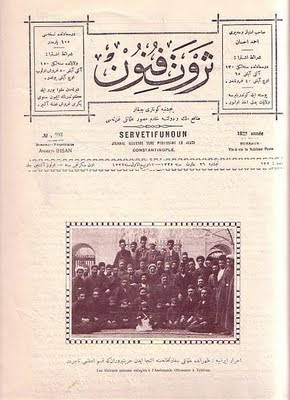Telmih

In Walter Andrew's approach to analyzing Ottoman Poetry, he tries as much as possible to include terminology for terms in Prosody, Rhetoric, etc using their original Ottoman titles, sometimes to amusing effect. Ighraq fi-l sifat (drowning in description), husn al-ta'lil (attributing a serene cause), and my favorite Telmih, which refers to literary allusion. All of the things that I've been reading lately, especially books on Persian literature and poetry, show an enviable depth of references to folklore, Islamic mythology, puns on Arabic Grammar, indigenous forms of fortune telling, Sufi symbology, Jurisprudence pissing contests, and the recitation of poetic verses so ingrained in the public conscious (at least for those supposed to know) that only either the first or second hemstitch is ever needed as reference. A few examples for fun:
- In Muhammed Ali Jamalzadeh's memoir of his youth in Isfahan, he visits a Zorkhaneh and explains how while doing exercises, the group calls out numbers by using stand-ins that either have phonological similarity (instead of saying three (seh), they say "causer of all causes" (sabab-saz)) or Islamic references "five people of the cloak, six corners of the grave of Hussein, the seventh Imam"
-In Sa'di's Gulistan he makes an elaborate pun using the coinciding of the word for 'dragging' and the Arabic term for putting a noun in the genitive case with 'raising' with the term for putting a noun in the nominative case so that the two meanings for:
بليت بنحوي يصول مغاضبا
علي كزيد في مقابله العمرو
علي جر ذيل يرفع راسه
و هل يستقيم الرفع من عامل الجر
1) I have been afflicted by a grammarian who attacks me in anger like Zayd beating amr. Despite dragging his skirt he will not lift his head. Can it be right on the part of one who has done such dragging to raise his head?
2) ....on putting the word skirt in the genitive case the word head cannot be put in the nominative case. Can the nominative case be correct in a construction that demands the genitive?
A part of what I want to explore, and have tried in my novella (to what success I don't know, I have an MIA Turkish proofreader), is to explore the effects of having an anachronistic foundation of cultural references. The protagonist explores a well-worn landscape (from my cultural-historical reference point) of hip New York of today using references to Ottoman novels, Persian poetry, and Arabic neologisms. I'm sure this sort of prank has been pulled before, but it's a fun exercise. Here is an extract, the quote is transliterated from Persian, it's from the Blind Owl:
Bu şehirde kaç yarı sarhoş çocuk parti gittiğini merak ettim. Apartman çıkmadan önce, sıkıcı tren yolculuk dayanmak için buzdolabımızdan başka bira aldım ve sokakta olmadan önce hepsi içmiştim. Sabahta cam şişe ve alüminyum toplanan bir hispanik göçmen bulacak bunu diye kaldırımda yerleştirdim. Hayal kırıklığı verici parti geri dönmediğim önce bu isimsiz kişi, gelişgüzel içtiğim bira şişesini kocaman plastik çantasında koyup, bushwick’in butün çöp dolu, graffitileşmis, bu-ı fasâd kokan sokaklar tarardı. Sarhoş hissetim. Hafif hissetim.
Misal inka kanun-ı sakil baray man vucüd nadaşt ve âzadane dunbâl ifkârım ki buzürg, lütif ve mevşkâf şode bud.

Comments